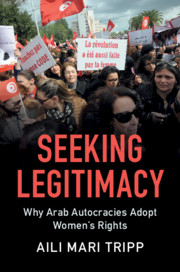Refine search
Actions for selected content:
12 results
7 - Turkey Turns
- from Part III - Twenty-First Century
-
- Book:
- Contesting Pluralism(s)
- Published online:
- 19 December 2024
- Print publication:
- 02 January 2025, pp 218-253
-
- Chapter
- Export citation
The relationship between state-provided Islamic education and Islamism
-
- Journal:
- Politics and Religion / Volume 17 / Issue 3 / September 2024
- Published online by Cambridge University Press:
- 02 October 2024, pp. 468-493
-
- Article
-
- You have access
- Open access
- HTML
- Export citation
4 - 2011–2018
-
- Book:
- Quest for Democracy
- Published online:
- 27 October 2022
- Print publication:
- 03 November 2022, pp 144-198
-
- Chapter
- Export citation
23 - New Islamic Antisemitism, Mid-19th to the 21st Century
- from Part III - The Modern Era
-
-
- Book:
- The Cambridge Companion to Antisemitism
- Published online:
- 05 May 2022
- Print publication:
- 02 June 2022, pp 430-447
-
- Chapter
- Export citation
4 - Kemalism’s Undesired Citizens
- from Part I - Kemalism and Its Desired, Undesired, Tolerated Citizens
-
- Book:
- Creating the Desired Citizen
- Published online:
- 25 May 2021
- Print publication:
- 27 May 2021, pp 72-88
-
- Chapter
- Export citation
5 - How Coup-Proofing Structured Military Response to Protest in Tunisia and Libya
-
- Book:
- Endgames
- Published online:
- 15 September 2020
- Print publication:
- 01 October 2020, pp 213-248
-
- Chapter
- Export citation
6 - Kemalists, Conservatives, and Christians in Turkey
- from Part III - Domestic Actors and Policy Change
-
- Book:
- Alien Citizens
- Published online:
- 20 September 2019
- Print publication:
- 10 October 2019, pp 131-152
-
- Chapter
- Export citation
Part III - Domestic Actors and Policy Change
-
- Book:
- Alien Citizens
- Published online:
- 20 September 2019
- Print publication:
- 10 October 2019, pp 129-180
-
- Chapter
- Export citation
Part II - Case Studies
-
- Book:
- Seeking Legitimacy
- Published online:
- 05 August 2019
- Print publication:
- 08 August 2019, pp 141-281
-
- Chapter
- Export citation
4 - Morocco
- from Part II - Case Studies
-
- Book:
- Seeking Legitimacy
- Published online:
- 05 August 2019
- Print publication:
- 08 August 2019, pp 143-191
-
- Chapter
- Export citation
5 - Algeria
- from Part II - Case Studies
-
- Book:
- Seeking Legitimacy
- Published online:
- 05 August 2019
- Print publication:
- 08 August 2019, pp 192-230
-
- Chapter
- Export citation

Seeking Legitimacy
- Why Arab Autocracies Adopt Women's Rights
-
- Published online:
- 05 August 2019
- Print publication:
- 08 August 2019
